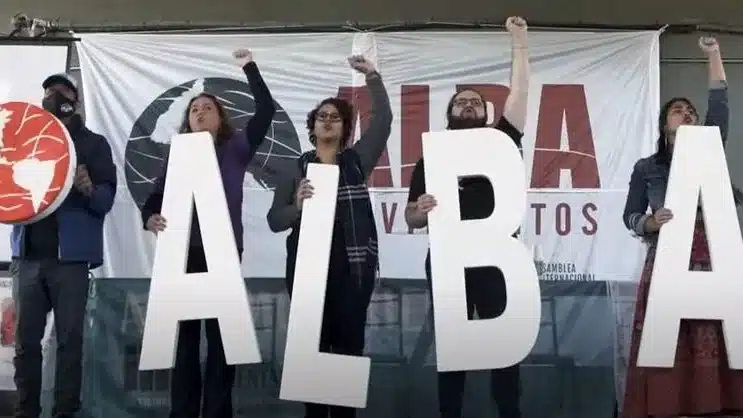
Continental articulation brings together popular movements from Latin America and the Caribbean. Photo: screenshot.

Orinoco Tribune – News and opinion pieces about Venezuela and beyond
From Venezuela and made by Venezuelan Chavistas

Continental articulation brings together popular movements from Latin America and the Caribbean. Photo: screenshot.
By Brasil de Fato – Aug 06, 2025
The documentary released on Monday, July 28, in Caracas, Venezuela, is now available on YouTube
The Bolivarian Alliance for the Peoples of Our America (ALBA) was born out of a commitment to the integration of peoples as a form of resistance to neoliberalism and imperialism. The trajectory of this alliance, which brings together popular movements from Latin America and the Caribbean, is portrayed in the documentary “El Abrazo de Los Pueblos” (“The Embrace of the Peoples”). The documentary was released on Monday, July 28, in Caracas, Venezuela, with representatives from various countries in attendance.
The date chosen for the launch is symbolic, as it marked the 71st anniversary of the birth of former Venezuelan President Hugo Chávez, a key figure, alongside Fidel Castro, in promoting continental coordination. “To be able to celebrate this launch on the 71st anniversary of the birth of our eternal commander Hugo Chávez, here in Bolivarian lands, is a great joy for us. It is a joy that strengthens our consciousness and makes us understand why we are here—what path our organizations, our social and popular movements have chosen throughout this great continent to remain steadfast, to advance with the legacy of the commander,” said Florencia Abregú, from the ALBA Movimientos secretariat.
The founding assembly of ALBA Movimientos took place in 2013 at the Florestan Fernandes National School, of the Landless Rural Workers Movement (MST), in Guararema, Brazil. The national leader of the movement, João Pedro Stedile, is one of the activists who participated in this historic moment. In the documentary, he recounts the trajectory of debates and mobilizations that resulted in the founding of ALBA, highlighting the debates surrounding the official celebrations of 500 years of Spanish colonialism in Latin America in 1992.
“We latched onto the theme of the 500 years and built a Latin American network called the Black Popular Resistance Movement, which, in its origins — with a lot of influence from the Church — wanted to contest Spain’s official celebrations in 1992. We began to organize and held a historic meeting in Guatemala. There were more than a thousand activists, many from Mexico and Guatemala, but there were also many from all over Latin America, and that’s where the idea was born: we must remain organized,” he recalls.
The film details how, from that meeting in Guatemala, a network of grassroots organizations was woven across the continent.
Watch the documentary
For the filmmakers, more than a historical record, “El Abrazo de Los Pueblos” is a “tool for struggle,” as Abregú points out.
“The idea is that this documentary be a tool for struggle for our spaces of community organization, collectives. … May it be a piece to carry forward these debates and discussions.
“We are facing a very complicated context, so building other meanings, engaging in this cultural and communicational dispute is absolutely fundamental,” points out Abregú.
Defeat of the FTAA
The production includes records of mobilizations in several countries. Raúl Laffitte, from Comuna Audiovisual, which produced the documentary, reports that the task of telling the story of the development of the regional movement was a long process.
“It is the culmination of a lot of work, many years in which we conducted many interviews, filmed a lot, thinking about how to try to demonstrate, in some way, this complex, diverse, and immense articulation in terms of people, cultures, and territories that is ALBA Movimientos,” said Raúl Laffitte.

The documentary features historical records of personalities such as Fidel Castro, Diego Maradona, and events such as the popular mobilization against the creation of the Free Trade Area of the Americas (FTAA), which was “buried” in Mar del Plata, Argentina, almost 20 years ago.
“The FTAA has been defeated by the peoples of this continent, and today the FTAA was buried here in Mar del Plata. Today, we bury the FTAA in Mar del Plata,” Chávez told a crowd at the time during the People’s Summit, which took place alongside the Summit of the Americas in the Argentine city.
The official event brought together heads of state and marked the defeat of the agreement authored by the United States. Leaders of Latin American countries, such as Néstor Kirchner (Argentina), Luiz Inácio Lula da Silva (Brazil), and Hugo Chávez (Venezuela) opposed the proposal.
Assembly in Cuba
Currently, ALBA Movimentos is preparing for its 4th Continental Assembly, which is scheduled to take place in Cuba in 2026, the year that marks the centenary of Fidel Castro.
At a meeting in Venezuela between June 22 and 24, delegates from the organization emphasized that the next meeting should promote the entry of new movements, deepen coordination with other regional alliances, and strengthen concrete actions of active solidarity with Cuba, Venezuela, and Haiti – seen as trenches of resistance against imperialism.